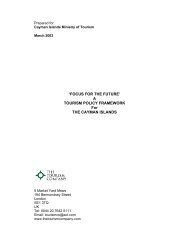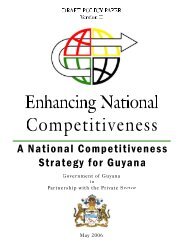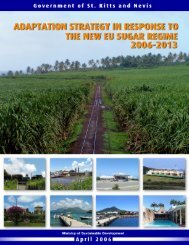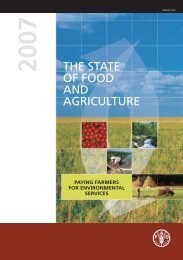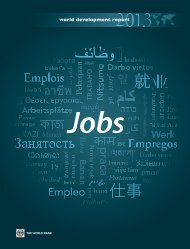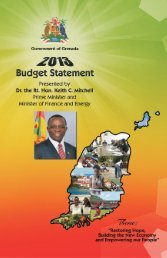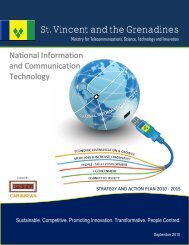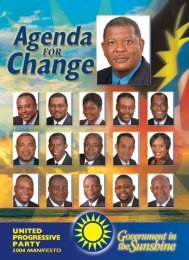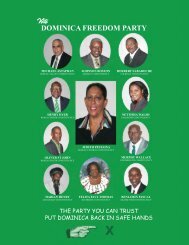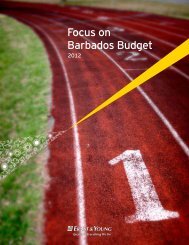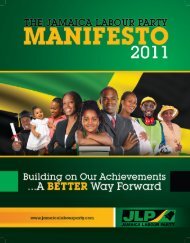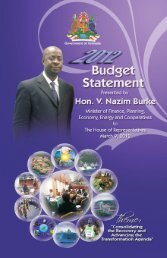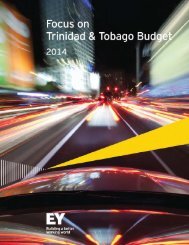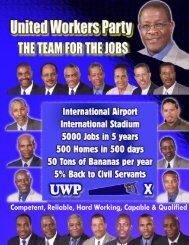Business Removing
Doing Business in 2005 -- Removing Obstacles to Growth
Doing Business in 2005 -- Removing Obstacles to Growth
- No tags were found...
Create successful ePaper yourself
Turn your PDF publications into a flip-book with our unique Google optimized e-Paper software.
36 DOING BUSINESS IN 2005<br />
FIGURE 5.2<br />
Registering property is complex in Uzbekistan<br />
Days<br />
100<br />
75<br />
50<br />
25<br />
0<br />
1<br />
Procedures<br />
12<br />
Source: Doing <strong>Business</strong> database.<br />
Cost<br />
Time<br />
Percentage of property value<br />
13<br />
12<br />
11<br />
10<br />
9<br />
FIGURE 5.3<br />
Harder to register in poor countries<br />
Time and cost to register property<br />
133<br />
116<br />
Days<br />
62<br />
51<br />
54<br />
56<br />
34<br />
Source: Doing <strong>Business</strong> database.<br />
OECD<br />
High income<br />
East Asia &<br />
the Pacific<br />
Middle East &<br />
North Africa<br />
South<br />
Asia<br />
Latin America &<br />
the Caribbean<br />
Europe &<br />
Central Asia<br />
Sub-Saharan<br />
Africa<br />
Percentage of property value<br />
3.2<br />
4.2<br />
4.8<br />
5.6<br />
6.8<br />
6.1<br />
14.4<br />
Inspections of the property slow the transfer of title<br />
in 30 countries, none rich, including Bangladesh, Bolivia,<br />
the Republic of Congo, Egypt, Ethiopia, Jordan and<br />
Malaysia. Uzbekistan has 2, compounding an already<br />
complex procedure (figure 5.2). Both inspections are to<br />
verify the property’s borders. The first double-checks the<br />
official cadastre records. The second triple-checks it.<br />
Both times, every neighbor must sign and seal the inspection.<br />
Such complexity increases the likelihood that<br />
bribes may change hands.<br />
Another large bottleneck, especially in Africa, is the<br />
requirement for government consent before property is<br />
transferred. It causes delays, usually requires an exorbitant<br />
fee and can be a major source of corruption.<br />
Lesotho, Malawi, Nigeria, Rwanda, Senegal and Zambia<br />
all have consent requirements. This is not always a relic<br />
of colonial days. Nigeria’s came with the Land Use Act<br />
of 1978. It was adopted to reduce conflict, but added a<br />
6-month delay and a 10% fee.<br />
The effect of such obstacles is evident across countries.<br />
Registering property is almost twice as efficient in<br />
rich countries as in poor ones (figure 5.3). Across regions,<br />
OECD and East Asian countries have the most efficient<br />
registration, averaging about 40 days and costing<br />
less than 5% of the property value. It is most difficult in<br />
Sub-Saharan Africa, where it takes more than 100 days<br />
and with costs of over 14%. Latin American countries<br />
typically require many procedures, including more due<br />
diligence, and take longer than average. Most countries<br />
in Eastern Europe and Central Asia have low costs—<br />
3.2% on average, with 6 countries at less than 1%. But in<br />
almost all, the seller will also need to pay value added<br />
tax. And low costs in Azerbaijan, Belarus, Moldova,<br />
Poland and Slovenia are offset by long delays.<br />
What else secures property rights?<br />
Doing <strong>Business</strong> in 2005 presents measures of the efficiency<br />
of registering property. But many other factors<br />
help secure property rights. Among these are the organization<br />
of the registry, the legal rights that come with<br />
ownership and the controls on property markets. Property<br />
lawyers and property registries provided detailed information<br />
on each of these areas. Several examples highlight<br />
how they matter.<br />
Organization of the registry and cadastre<br />
Property registries record legal ownership, and the cadastre<br />
records physical characteristics and identifies boundaries.<br />
In the Netherlands all properties are recorded in the<br />
registry and cadastre, with the two unified to avoid conflicting<br />
records. Registry information can be accessed online<br />
without restriction. In Costa Rica about 1.2 million<br />
properties are registered, but almost 1.7 million plots are<br />
supposedly recorded in the cadastre. The total area of all<br />
registered properties exceeds the area of the country by<br />
6% (figure 5.4). Evidently, some records are duplicates or<br />
contradictory. Although it takes only 21 days and 3.6% to<br />
register transfers, the value of title is questionable as a result.<br />
Burundi has the opposite problem—how to verify<br />
who owns what, with less than 1% of properties recorded<br />
in a cadastre that is only paper-based.



